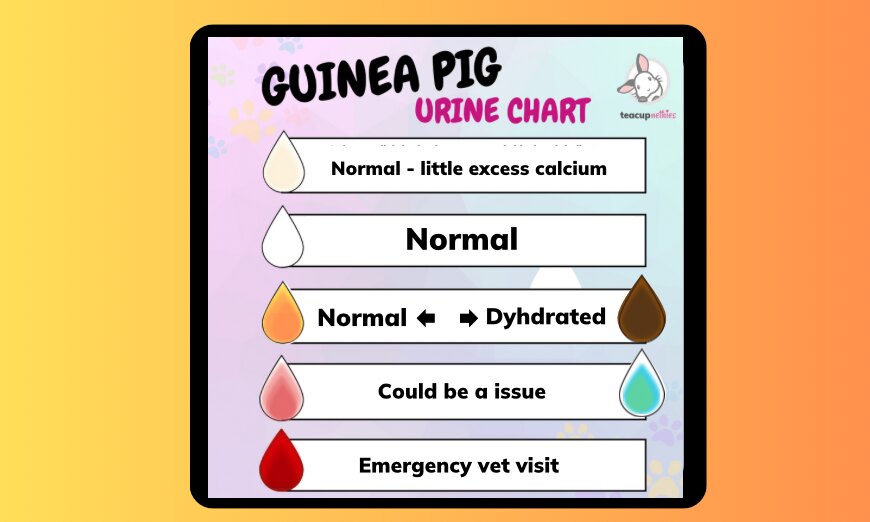Guinea Pig Pee: Colourful Key to Your Piggies Health

Understanding Guinea Pig Pee Colours: What You Need to Know
Guinea pigs are delightful, small pets known for their playful personalities, adorable squeaks, and the way they communicate through body language. As a responsible guinea pig owner, it’s crucial to be aware of your pet’s health, and one of the most telling indicators of their well-being is their urine. While it might not be the most glamorous topic, understanding the various colours of guinea pig pee can provide valuable insights into their health and help you take prompt action if something is amiss.
Why Monitor Guinea Pig Urine?
Guinea pigs are prey animals by nature, which means they are experts at hiding signs of illness. This makes it all the more important for owners to be vigilant about any subtle changes in their pet’s behavior or physical condition. Urine colour, in particular, can reveal a lot about what’s going on inside your guinea pig’s body. By paying attention to the colour of your guinea pig’s pee, you can detect potential health issues early on, ensuring your pet stays happy and healthy.

Normal Guinea Pig Pee Colours
- Clear or Pale Yellow:
- What It Means: This is typically a sign of well-hydrated and healthy guinea pigs. Clear or pale yellow urine is the most common colour and indicates that your pet is drinking enough water and that their kidneys are functioning properly.
- What to Do: Continue with your current care routine. Ensure your guinea pig has constant access to fresh, clean water.
- White or Cloudy:
- What It Means: White or cloudy urine can be a normal occurrence in guinea pigs. It usually indicates the presence of excess calcium being excreted from the body. Unlike some animals, guinea pigs do not have the same capacity to absorb and regulate calcium, so what isn’t needed is passed out in their urine.
- What to Do: Monitor your guinea pig’s diet. Too much calcium can lead to bladder stones, so ensure they are not getting excessive calcium-rich foods. Consider consulting with a vet to adjust their diet if needed.
- Orange or Rust-Coloured:
- What It Means: Occasionally, guinea pig urine may appear orange or rust-colored. This can sometimes be caused by oxidation, where the urine changes colour after being exposed to air. Certain foods, such as carrots or beetroot, can also cause a temporary change in urine color.
- What to Do: Observe your guinea pig’s behavior and recent diet. If the orange or rust color persists without any dietary changes, it’s best to consult a vet to rule out underlying issues.
Abnormal Guinea Pig Pee Colours
- Red or Pink:
- What It Means: Red or pink urine can be alarming and may indicate the presence of blood, a condition known as hematuria. Blood in the urine can be a sign of urinary tract infections (UTIs), bladder stones, or other serious health issues.
- What to Do: Seek veterinary attention immediately. A thorough examination and potentially some diagnostic tests (like a urine analysis) will help determine the cause and appropriate treatment.
- Brown or Dark Orange:
- What It Means: Brown or dark orange urine can signal dehydration or the presence of blood that’s been oxidised , which might indicate an infection or other medical issues.
- What to Do: Ensure your guinea pig is drinking enough water. If the dark colout persists, consult a veterinarian to check for dehydration or other health concerns.
- Green or Blue-Tinted Urine:
- What It Means: This is very unusual and may be related to food dyes or medications. However, it can also be a sign of a metabolic disorder or other serious health issues.
- What to Do: If you notice green or blue-tinted urine and can’t attribute it to something your guinea pig has eaten, contact your vet right away.
Factors Affecting Urine Colour
Several factors can influence the colour of your guinea pig’s urine, including:
- Diet: Foods rich in pigments (like beetroot) or calcium can change urine colour.
- Hydration: Dehydrated guinea pigs tend to have more concentrated and darker urine.
- Medications: Some medications can alter the color of urine.
- Health Conditions: UTIs, bladder stones, and other health issues can lead to abnormal urine colours.

When to See a Vet
Any sudden or unexplained change in your guinea pig’s urine colour should be cause for concern, especially if accompanied by other symptoms like lethargy, squeaking while urinating, loss of appetite, or changes in drinking habits. If you observe any of these signs, it’s crucial to consult a veterinarian as soon as possible. Early diagnosis and treatment can make a significant difference in the outcome for your guinea pig.
Maintaining Optimal Urinary Health
To help maintain your guinea pig’s urinary health:
- Provide a Balanced Diet: Ensure your guinea pig’s diet includes a variety of fresh vegetables, high-quality pellets, and unlimited hay, with a careful balance of calcium intake.
- Ensure Proper Hydration: Always provide fresh, clean water and monitor your guinea pig’s drinking habits.
- Regular Vet Check-ups: Routine veterinary visits can help catch any potential health issues early.
Conclusion
Understanding your guinea pig’s pee colors is a simple yet effective way to monitor their health. By keeping an eye on the color and consistency of their urine, you can ensure your pet stays healthy and happy. Remember, when in doubt, it’s always better to consult with a vet to address any concerns you may have.
Your guinea pig’s health is in your hands—by being observant and proactive, you can provide them with the best care possible.
